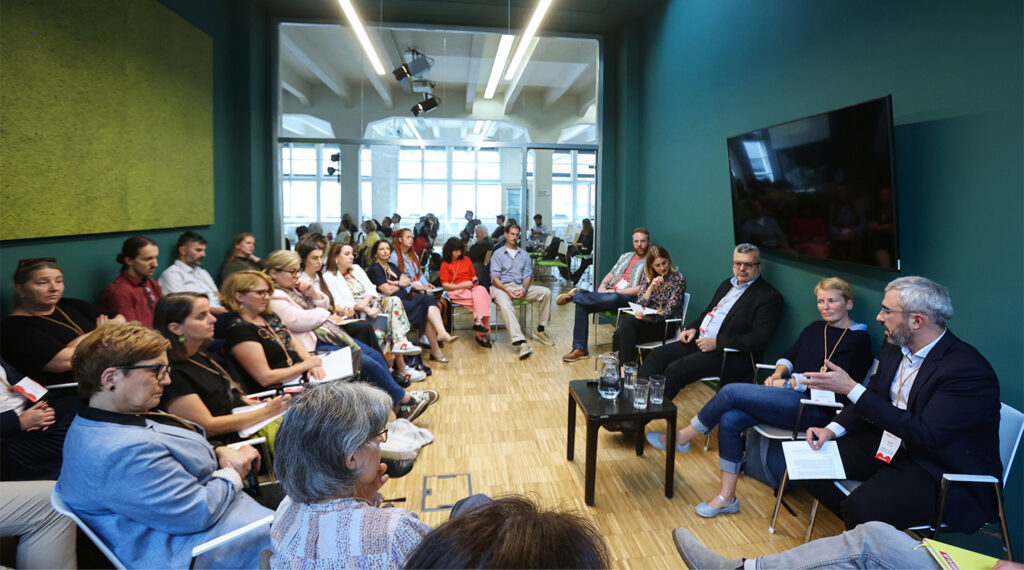Is Orban outsmarting philanthropy?

Autocrats in Central and Eastern Europe are obsessed with independent journalism. They badmouth the press and label them as ‘opposition’ every chance they get. They create Foreign Agent Laws to starve independent outlets of their funding. They resort to legal intimidation, physical threats and murder to silence the truth. They understand and fear the power of information and will spare no expense to control it. On the flipside, our Philea membership survey points to journalism as the least chosen topic of interest two years in a row. Are philanthropists missing a trick? Are we not valuing journalism as much as the likes of Orban? Or are we unconvinced that our support could make a difference?
Last week at KoneKtor, I brought together a panel of journalists and journalism funders in the CEE region to help foundations understand why supporting journalism has become more indispensable and meaningful than ever before.
A politicised market model
In 2011, Tamas Bodoky founded atlatszo.hu – “atlatszo” means transparent in Hungarian – as the first Hungarian investigative journalism non-profit. While Tamas left his former publisher and established Atlatszo to be free from political influence, the challenge to retain editorial independence remains. In Hungary, where mainstream media is captured by the state and critical voices are labelled as opposition, advertising revenue doesn’t follow the market model, but political logic. With businesses afraid of being associated with critical reporting, sustaining an investigative outlet solely on ad revenue is simply infeasible.
To finance their work, some outlets experiment with forms of paywalls. For journalism non-profits established to promote transparency, accountability, and freedom of information, using paywalls feels contradictory to their goal. It would also mean losing even more readers to propaganda news, which is freely available. Instead, many critical outlets turn to crowdfunding. Yet the pressure to choose a side remains. Whilst the situation in the Czech Republic is not as alarming as that in Hungary, polarisation creates a highly volatile readership… to quote Pavla Holcová, “We are not publishing stories about local kittens”.
The kind of stories published at Investigace.cz are bound to create strong opinions and spark emotions. As investigative outlets naturally report more often on those in power, especially the ones spending taxpayer money, they attract more readers and donors that align with the opposition or are unwillingly identified or branded as against the reigning party. When they inevitably produce an article that criticises someone in the opposition, the result can be a devastating loss of donors and readership, and accusations of having been bought up by ‘the other side’.
Polarisation doesn’t only endanger the editorial independence of investigative journalism. Politicised and contentious reporting gets more traction and is actively promoted by Big Tech platforms. In contrast, general interest media focused on keeping the public informed and engaged in their local and national environments have a hard time ‘selling’ their non-politicised content to the public, and also attract less funders. David Klimeš understands foundations favouring specific outlets, especially when they align with their personal or organisational values. With the Endowment Fund for Independent Journalism however, David is on a mission to help local donors (e.g. business owners) understand that a model of concentrated ownership where public opinion is swayed by the highest bidder can easily backfire when in the ‘wrong’ hands. In other words, a stable and independent media is good for business. While project funding or targeted funding for a specific outlet can serve as a great entry point for funders new to journalism, the NFNZ brings local funding together and invests in media pluralism, balancing support for a specific issue or outlet versus support for the sector as a whole. Additionally, it is now also looking to redirect more support to local media outside major cities where the only access to information is through outlets owned by local majors.
Scare tactics
My main takeaway from the conversation at KoneKtor is that in times of state sponsored polarisation, philanthropic support is a more crucial source of income than it ever was. It alleviates the pressure on independent media outlets to conform to a polarised readership or a market logic that serves the political agenda. It promotes nuanced reporting, critical yet party-neutral investigations and it safeguards the access to general interest information.
This last lifeline is exactly what Orban and other autocratic regimes in the CEE are now trying to cut. With a recent surge in ‘Foreign Agent’-style laws, European autocrats have added a dangerous instrument to their playbook. Despite the official communication that Hungary’s new Sovereignty Protection Office was established to stop domestic political actors from accepting foreign funds, one of the first targets they cracked down on was the independent media outlet Atlatszo. Not only do these laws impose crippling monitoring and reporting requirements, they are an obvious attempt at delegitimising their target’s work in the eyes of the public and scare off funders.
We at Philea will continue to voice our concerns over the rise of Foreign Agent Laws; their detrimental effects on targeted grantees should be taken seriously. Fortunately, the message from journalism funders at KoneKtor was resoundingly clear: these laws will not stop international funding from reaching independent media in Central and Eastern Europe. They will not deter foundations already active in the region and some have even ramped up their support. Yet much more funding is needed if we want independent journalism in Europe to endure. If you are not supporting journalism yet, let Orban’s obsession be all the proof you need of the power and value of a free press.
Find out how you can get involved in funding journalism with the Journalism Funders Forum.
Authors

